
The Vanuatu Government is keen to support the introduction of the In-Country Science Programme by the University of the South Pacific.
“The government and I have been discussing the introduction of face-to-face science delivery in Vanuatu by USP since 2016 and we now have this opportunity to utilise it,” said Jean Pierre Nirua, Minister of Education and Training during an information session at the Emalus Campus last week.
a statement said the the session included a promotion of full science programmes that will be offered at the Emalus Campus from Semester 2 of 2018. As part of this programme, the Science Teachers Accelerated Programme (STAP) is an opportunity for USP’s science teachers to upgrade their qualification to a Bachelor of Science degree.
Nirua said that apart from strengthening the school system, the Ministry of Education is focusing on the capacity building of qualified teachers to teach science subjects.
He said he had observed that STAP is an excellent platform to build national capacity and assured that the Government would make sure that all eligible students and teachers would be offered scholarships.
Ruben Markward, newly-appointed Campus Director welcomed the students, staff and general public that attended in large numbers stating that the campus welcomes the In-Country Science Programme offered by FSTE and assured that full support would be provided for its successful delivery.
Dr Bibhya Sharma, Associate Dean at the FSTE stated that his team from Laucala Campus in Fiji were in Vanuatu for a week to carry out informative sessions.
The team will also be visiting schools as part of a request from the Vanuatu Government and also reach out to communities to promote the mode of operation of this programme.
“This is in response to the Vanuatu Government’s request through the Ministry of Education to have more science programmes available face-to-face for students at Emalus Campus,” Dr Sharma said.
“The Vanuatu Government will provide scholarship for the students so that we could bring the programmes here. It is very expensive sending students overseas, so in-country science programme in Vanuatu is one way to reduce the total costs by almost 60 per cent,” he stated.
Dr Sharma reiterated that some of the science courses will require special lab sessions that will see students attending a boot camp in Laucala for two weeks.
On the other hand, he suggested that there is also an opportunity for the Vanuatu Government to upgrade lab facilities in schools and institutes and even at Emalus Campus.
He added that STAP was a successful model being implemented in Samoa and Tonga with extremely impressive academic results and even surpassing some of the regular and overall grades throughout the region.
With regards to resources, Dr Krishna Kotra, Science Programme Coordinator at the Emalus Campus, explained the need for resources to begin 300-level courses and stressed that Vanuatu needs more science graduates for national capacity building.
At Emalus Campus, face-to-face courses (Chemistry and Biology) began in 2015 while in 2016 200-level courses in Chemistry began.
“If they complete almost 80 to 90 per cent of the courses here they do not have to go to Laucala Campus to complete their programme,” he said.
“Science students can fully graduate in Vanuatu if the government wants to fund these resources in terms of laboratories,” he mentioned.
Dr Sharma concluded that the two main ideas of STAP is bringing science to this region and reducing expenses for private and government-sponsored students.
He added that USP has had some fruitful discussions with various stakeholders and looked forward to the start of the programme in July.
Photo supplied
